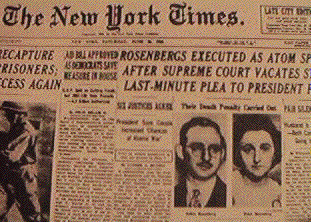Rosenberg Tragedy

The Rosenberg tragedy—The cost of not coming clean
Something is to be said for confessing. Example—The Rosenbergs.
In 1953, Julius and Ethel Rosenberg were executed for conspiring to commit espionage. The Government contended that they stole the secret to the Atom Bomb and sent it to the Soviet Union. The Rosenbergs maintained their innocence to the end, refusing to squeal. As a result, their two sons were turned into orphans. The case festered for years. There were world-wide protests. There were accusations of a frame-up. For Communists, it was the gold opportunity to trash America.
During the mid-1970′s, when I was in law school, one of the Rosenbergs’ sons came to speak. He was passionate, obsessed, and tortured. Raised by foster parents in the orbit of the Communist Party, he grew up believing his parents had been framed, then murdered by the U.S. Government. The sone were trying to get the Government records. They were trying to re-open the case.
In the past few years, the truth has painfully emerged. It had long been alleged that Ethel Rosenberg had nothing to do with the crime and that the Government prosecuted her and sought the death penalty to force her to confess and name other conspirators. It was alleged that her brother, David Greenglass, lied on the witness stand to frame the Rosenbergs so that Greenglass’s wife would not be prosecuted.
In the book, “The Brother,” New York Times reporter Sam Roberts interviewed David Greenglass. Greenglass admitted that he stretched the truth when he said that Ethel Rosenberg typed the stolen information.
Over the past few days, co-defendant, Morton Sobell told Roberts that he and Julius Rosenberg had transmitted information to the Soviet Union. Sobell characterized the information as junk rather than valuable nuclear secrets. Nevertheless, Sobell conceded that he and Julius had spied and that Ethel at least knew about it.
Finally, Sam Roberts interviewed the Rosenberg’s sons. As a result of their investigations and the release of Government documents, the sons had slowly lost faith in their parents’ innocence. However, they still wanted answers. After speaking to Morton Sobell, they finally accepted that their father had been a spy.
Had the Rosenbergs only come clean. They would have spared their sons from being orphans. They would have spared their sons from a lifetime of false beliefs and false hopes.
However, they put their ideals first. They put the honor of not squealing ahead of their family.
Not ever case should be pleaded out. However, sometimes a confession is the best choice.